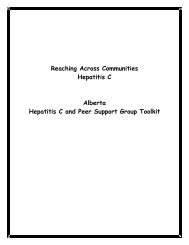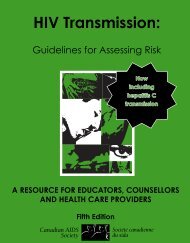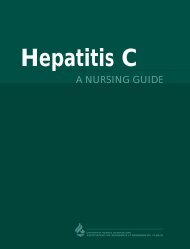A Guide to Primary Care of People with HIV/AIDS - Canadian Public ...
A Guide to Primary Care of People with HIV/AIDS - Canadian Public ...
A Guide to Primary Care of People with HIV/AIDS - Canadian Public ...
Create successful ePaper yourself
Turn your PDF publications into a flip-book with our unique Google optimized e-Paper software.
A <strong>Guide</strong> <strong>to</strong> <strong>Primary</strong> <strong>Care</strong> <strong>of</strong> <strong>People</strong> <strong>with</strong> <strong>HIV</strong>/<strong>AIDS</strong><br />
Chapter 2: Approach <strong>to</strong> the Patient<br />
Chapter 2:<br />
Approach <strong>to</strong> the Patient<br />
John V. L. Sheffield, MD<br />
Gloria A. Casale, MD, MSPH<br />
BASIC ELEMENTS OF CARE<br />
STIGMA AND DISCRIMINATION<br />
CONFIDENTIALITY AND DISCLOSURE<br />
PATIENT EDUCATION<br />
RISK ASSESSMENT AND COUNSELING<br />
KEY POINTS<br />
SUGGESTED RESOURCES<br />
2<br />
BASIC ELEMENTS OF CARE<br />
What are the special challenges <strong>of</strong> caring<br />
for patients <strong>with</strong> <strong>HIV</strong>/<strong>AIDS</strong>?<br />
Providers need <strong>to</strong> be mindful <strong>of</strong> several special issues:<br />
• Patients infected <strong>with</strong> <strong>HIV</strong> face a complex array <strong>of</strong><br />
medical, psychological, and social challenges. A strong<br />
provider-patient relationship, the assistance <strong>of</strong> a<br />
multidisciplinary care team, and frequent <strong>of</strong>fice visits<br />
are usually required <strong>to</strong> provide excellent care.<br />
• The stigma associated <strong>with</strong> <strong>HIV</strong>/<strong>AIDS</strong> places a major<br />
psychological burden on patients. Confidentiality is<br />
critical, as is a careful assessment <strong>of</strong> each patient’s<br />
emotional support system.<br />
• Ethnic minorities are over-represented among people<br />
<strong>with</strong> <strong>HIV</strong>. Efforts <strong>to</strong> understand and acknowledge<br />
the beliefs <strong>of</strong> patients from a variety <strong>of</strong> cultural<br />
backgrounds are necessary <strong>to</strong> establish trust between<br />
providers and patients.<br />
• Providers play a key role in the public health system’s<br />
<strong>HIV</strong> prevention strategy. Disease reporting, partner<br />
notification, and risk assessment are important<br />
aspects <strong>of</strong> care.<br />
• Many patients have inaccurate <strong>AIDS</strong> information that<br />
can heighten their anxiety, sabotaging treatment<br />
adherence and appropriate prevention behaviors.<br />
They need assurance that <strong>HIV</strong> is a treatable disease<br />
and that <strong>with</strong> successful treatment, patients may live<br />
indefinitely. They also need <strong>to</strong> hear explicitly that <strong>HIV</strong><br />
is transmitted through sexual contact, intravenous<br />
drug use, and blood contact (perinatal or other) and<br />
how they can prevent transmission <strong>to</strong> others.<br />
What are the important components<br />
<strong>of</strong> good <strong>HIV</strong> care?<br />
The elements that ensure good care for people <strong>with</strong><br />
<strong>HIV</strong>/<strong>AIDS</strong> include mechanisms for coordination and<br />
communication <strong>of</strong> care:<br />
• Clinics must <strong>of</strong>fer a nonjudgmental and supportive<br />
environment because <strong>of</strong> the sensitive nature <strong>of</strong> issues<br />
that must be discussed.<br />
• A multidisciplinary approach, utilizing the special<br />
skills <strong>of</strong> nurses, pharmacists, nutritionists, social<br />
workers, and case managers is highly desirable <strong>to</strong> help<br />
physicians address patients’ needs regarding housing,<br />
medical insurance, emotional support, financial<br />
benefits, substance abuse counseling, and legal issues.<br />
• Providers and other clinic staff should be prepared <strong>to</strong><br />
conduct appropriate interventions and make timely<br />
referrals <strong>to</strong> community resources and institutions.<br />
• The primary provider should coordinate care, <strong>with</strong> close<br />
communication among providers across disciplines.<br />
• Individual <strong>of</strong>fice visits should be long enough <strong>to</strong> allow<br />
a thorough evaluation.<br />
• Providers must be able <strong>to</strong> see patients frequently for<br />
good continuity <strong>of</strong> care, and clinic scheduling should<br />
be flexible so that patients <strong>with</strong> acute problems can<br />
be seen quickly.<br />
• A range <strong>of</strong> medical resources, including providers <strong>with</strong><br />
subspecialties and labora<strong>to</strong>ry expertise, must be in<br />
place (see Chapter 16: Clinic Management).<br />
• Patient education is a vital aspect <strong>of</strong> care that begins<br />
during the initial evaluation and continues throughout the<br />
course <strong>of</strong> care (see section on Patient Education below).<br />
What steps can providers take <strong>to</strong><br />
enhance care?<br />
Providing comprehensive care for patients infected<br />
<strong>with</strong> <strong>HIV</strong> requires a lot <strong>of</strong> time, attention <strong>to</strong> detail, and<br />
a strong patient-provider relationship. Specifically, the<br />
provider should do the following:<br />
• Discuss issues in a straightforward fashion <strong>to</strong> foster<br />
trust and openness.<br />
• Be realistic about the seriousness <strong>of</strong> <strong>HIV</strong> disease and<br />
yet, <strong>to</strong> instill hope, be optimistic about the potential <strong>to</strong><br />
res<strong>to</strong>re health and <strong>to</strong> provide comfort. Give accurate<br />
information regarding prognosis and the real hope<br />
that antiretrovirals provide.<br />
• Encourage patients <strong>to</strong> learn all they can about<br />
their condition and take an active role in decisions<br />
regarding their care.<br />
U.S. Department <strong>of</strong> Health and Human Services, Health Resources and Services Administration, <strong>HIV</strong>/<strong>AIDS</strong> Bureau<br />
5

















